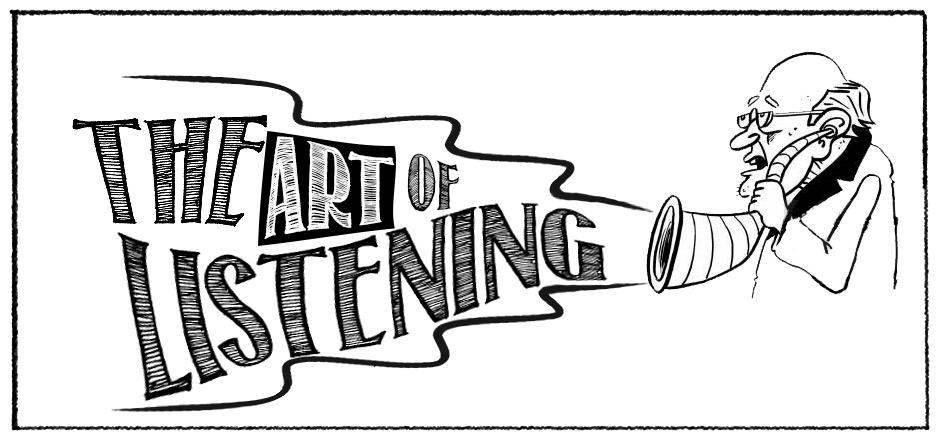The 2008 global financial meltdown. Hurricane Katrina. Pearl Harbor. 9/11. These are only a few examples of disasters that might have been significantly less horrific, and in some cases maybe even outright prevented, if people had listened to those trying to sound the warning.
The intelligence failures of Pearl Harbor, repeated again during 9/11 have been well documented in countless books. The warnings of levee failure in advance of Hurricane Katrina were so numerous that in retrospect it seems to have been common knowledge among the federal, state, and local government agencies involved. The post disaster finger-pointing among those groups is every bit as prolific as the pre-disaster warnings appear to have been. Academy award-winning movie The Big Short (based on the Michael Lewis book of the same name) vividly portrays just a few of the people who were warning of a looming financial meltdown.
All of these examples tip on the extreme end of listening failures. In our day-to-day experiences, it is rare that our lack of effective listening could affect the lives of thousands of people. This doesn’t, however, lessen our burden to give our full attention to listening when we engage in communicating with the people in our lives.
We’re not very good at it.
The art of listening is both skill and art form. And one it takes practice to improve at. For most of us, we start listening the moment we’re born. We don’t think of it as a skill; we don’t think of it as something we have to expend effort at.
But, again, we’re not very good at it. We have two ears and one mouth, but not many of us seem to use them in those proportions.
There are many ways to improve your listening. Below are several that I’ve observed first-hand over my career more times than I care to recall. Some are things to be aware of and avoid while others are techniques you can apply during the next conversation you have.
WAITING TO TALK
Many people who think they’re listening, aren’t. Instead, they’re waiting to talk. Some of the more extreme ones don’t even wait that much, preferring to interrupt if forced to wait too long.
Like a search engine gone haywire, they wait for keywords that match what they already wanted to say. And when one of those keywords hits their input, they launch into their already-conceived thoughts. If it coincides with some of what you said, it’s an unintended bonus.
While reading this, you may have had a number of people pop into your head as Exhibit One of this kind of inconsiderate behavior. Pardon me while I set the record straight… it’s you.
This tendency isn’t exclusive to obnoxious a-holes. We’re ALL guilty of it at times. Before pointing fingers at others, be on the lookout for this behavior in yourself. Here’s a hint, if you’ve interrupted the person you’re speaking with multiple times, you’re probably waiting to talk instead of listening.
When you recognize this happening, force yourself to concentrate on what they are saying so that when they’re done speaking you can respond, “What I think you’re saying is,” and then repeat to them what you just heard. This technique forces you to think about what the other person is saying and it short-circuits your ability to launch right into the point you want to make.
LISTENING TO DEFEND
Another bad habit is when we listen to defend rather than listening to understand. This happens when we focus on one specific thing said in the conversation. Instead of looking at the forest, we decide to focus in on a single tree. This habit is less obvious than waiting to talk as it sometimes appears as if we’re listening, and we are, but we’re only listening to a thin slice of the conversation.
Often though, it happens to us. After getting a portion of your point across – sometimes even all of it – they will ask you for a specific example. They will then spend the rest of the conversation focused on disputing your example rather than addressing the overall point you attempted to make.
They will try to suck you into the specific example battle in order to change and control the conversation. Don’t follow them into this trap. Surrender by saying some version of, “it’s not really about the example, it’s about…” and attempt to restate your point. If they continue to argue the example, you can use a last resort measure: “If I gave you six examples would we debate each one or could we talk about the fact that there are a half-a-dozen examples?”
THE HIGHER YOU GO THE LISTENER YOU GET
The higher up you climb in the org chart, the bigger the ratio needs to be between listening and talking. If it’s 2 to 1 at the start of your career, it should be closer to 10 to 1 by the time you reach the C-suite level.
Listening is important at all levels in an organization, but the higher up on the org chart a person sits, the more their job relies on listening to direct reports and other people throughout the organization, synthesizing the data, deciding on the proper action, and then delegating those actions. Delegation is the only one of those processes that should be considered a “talking activity.”
When A.G. Lafley stepped down after 14 years (across two terms) as the CEO of Procter & Gamble, he was widely credited with revitalizing the company and expanding P&G’s already impressive lineup of market-leading brands. When asked what advice he would give other top-level CEO’s who wanted to experience similar success, Lafley replied, “You have to see things as they are and not what you want them to be. You have to be transparent and open to suggestions and criticism. And the most important aspect of effective leaders is to LISTEN, LISTEN, and LISTEN.”
LEAVE SPACE
Ever have a conversation with someone and find yourself wondering how they could go for so long without taking a breath? I once worked with someone who would speak for so long before breathing that I needed a notepad to keep up with everything I wanted to respond to. There is one specific conversation I remember where, once he completed his initial statement, I was forced to say, “Ok, here are my thoughts on the seven points you brought up.”
Leave space in the conversation for the person you are talking with. Otherwise, you are talking “at someone,” and not “with someone.” Don’t rattle off seven different points in a row like you’re in a race with your own brain. Offer up a thought and then leave space for the person you’re talking with to respond. It doesn’t need to be a big space, just big enough for them to squeeze a word into if they have something to add. If they don’t, then move on to the next thought. If your thought does require feedback, leave a bigger space. Even add in a prompt if necessary.
When a speaker doesn’t leave space in a conversation, it forces the other person to either interrupt, or just sit there and take it. And when the other person chooses the latter, then that conversation you thought you were having just became something completely different: a lecture.
When was the last time you entered a conversation only to exit a lecture, and felt satisfied with the exchange?
Leave space
PRACTICE
The average person has somewhere between twenty to thirty conversations per day. It happens so frequently that it’s no wonder we put ourselves on auto-pilot for 99% of them. But imagine if we chose five conversations each day to approach differently; to treat as opportunities to work on the art of listening. And if we were able to do that every single day? We would become experts in no time at all and I believe that the rewards of that expertise would astound us personally, professionally, and in ways we couldn’t even imagine.
NOTES:
I’ve been thinking about listening so much this week that I started using actor’s voices in my head to playback certain conversations from my memory. It was a fun diversion. This was my starting lineup.
Top 10 Actor’s Voices (alphabetical order):
- F. Murray Abraham
- Gillian Anderson
- Julie Andrews
- Alec Baldwin
- Morgan Freeman
- Kelsey Grammer
- Phil Hartman
- Edward Hermann
- James Earl Jones
- Kathleen Turner
Anyone I forgot? Someone who shouldn’t be on my list? Light up the comments section below with your thoughts.
The Weekly Struggle:
Earlier this week, I posted about the difference between the correct answer and the right answer. This is a topic I am painfully familiar with. And not just this week. I have too often chosen the correct answer instead of the right answer, also known as being “dead right.” This bad habit has probably been more damaging to my efforts than anything else I do. As a matter of fact, going back to another post from earlier this week, choosing the correct answer over the right answer has likely accounted for 80% of my difficulties in my career.
I can think of at least one professional relationship I destroyed as a result of mounting my high horse and galloping up the hill of correctness. I absolutely had the facts on my side and it absolutely did not matter. If I had focused on the right answer instead of proving how correct I was, I still would have ended up with the same business result, but I wouldn’t have suffered the significant collateral damage that I spent the following six months cleaning up.
These days I try to remain focused on the right answer by asking myself, “What am I wanting to achieve here?” When I remain disciplined and do this, it helps, and I get the right answer more often than I used to get, but I still find myself battling my reactions from time to time. In those instances, I like to paraphrase a line from Laurel & Hardy:
Well, here’s another fine mess I’ve gotten myself into.
New Book Spotlight:
Austin Kleon (who resides in Austin, TX) takes a different approach to writing, starting off his career as an author by redacting newspaper articles to create poetry. As a writer/artist, his books are all highly visual affairs. His next book, Keep Going, is currently slated for an April 9th of 2019 release, which is even further out than last week’s Seth Godin title. However, Kleon has other great books you can get right now (I would recommend starting with Steal Like An Artist) and he’ll be speaking next week just a short drive from my house.
Keep Going, written in a style similar to Steal Like An Artist and Show Your Work, finds Kleon focused on ways for people to stay creative and on track in the face of personal burnout and the constant distraction of the newest shiny thing.
Kleon appears at Texas Lutheran University in Seguin this Tuesday (9/18) in the Jackson Auditorium from 7:30 – 9pm. He’s a frequent speaker at events across the country and private corporate functions. This TLU event is being underwriter by a university endowment and will be free and open to the public. My bride and I will be going along with our youngest. Maybe we’ll see you there.
Best thing I saw this week:
First, a confession. This is actually from last week.
The amount of love that went into making this is palpable and something I try to achieve with everything I write. When I’m lucky, it shines through the words. If someday I could hit the level of love this video does with even one out of every ten things I write, I’d be happy.
Best thing I heard this week:
The new season of Malcolm Gladwell’s podcast, Revisionist History, includes a fascinating two-part series on the fallibility of memory. I’ve been sensing this in myself lately and have taken to fact-checking my own memories where I can. These two podcasts also reintroduced me to the amazing Larry Adler and made me realize that Matt Lauer is even more despicable than I previously thought.
A Polite Word For Liar (Memory Part 1)
Free Brian Williams (Memory Part 2)
Quotes:
You aren’t learning anything when you’re talking.
Lyndon Johnson
Wisdom is the reward you get for a lifetime of listening when you would have rather talked.
Mark Twain
End Credits:
Thank you to my wonderful bride for creating the title graphic again this week. The picture of F. Murray Abraham comes from the press materials for Wes Anderson’s film Grand Budapest Hotel. The “Uptown Funk” and classic movie stars mashup was created by YouTube user Nerd Fest UK.






0 Comments